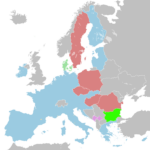Central Banks Eye Rate Cuts as Eurozone Inflation Slows
- Eurozone inflation falls below ECB’s target for the first time in over three years
- Consumer prices increased by 1.8% on year in September across the eurozone
- Inflation could rise again in the year’s final months due to base effects in energy
- ECB President Christine Lagarde suggests lowering inflation forecasts and cutting interest rates
- Lower inflation in Europe comes amid sputtering growth in the 20-member eurozone
- Economic activity becomes a main area of concern for policymakers
- Germany faces growing risk of recession after unexpected contraction in Q2
- Auto supplier Bertrandt to cut up to 1,200 positions due to weak demand and trade snarls
Eurozone inflation has dropped below the European Central Bank’s (ECB) target for the first time in over three years, signaling a potential end to the struggle with high inflation. Consumer prices increased by 1.8% year-on-year in September across the 20 nations that make up the eurozone. However, inflation could rise again in the final months of the year due to base effects in energy. ECB President Christine Lagarde suggests lowering inflation forecasts and cutting interest rates, as economic activity becomes a main concern for policymakers amid signs of weakening growth in the 20-member eurozone. Germany faces a growing risk of recession after unexpectedly contracting in Q2, with auto supplier Bertrandt announcing up to 1,200 job cuts due to weak demand and trade disruptions.
Factuality Level: 8
Factuality Justification: The article provides accurate information about Eurozone inflation rates, central bank policies, and their impact on interest rates and economic activity. It also discusses the potential for future changes in inflation forecasts and the possibility of a recession in Germany. The article is well-researched and objective, with no clear signs of sensationalism or personal perspective.
Noise Level: 6
Noise Justification: The article provides relevant information about Eurozone inflation rates and their relation to central bank policies, but it also includes some repetitive information and focuses on specific countries’ inflation rates without exploring the broader implications or long-term trends. It could benefit from more analysis of the underlying causes and potential consequences of these economic shifts.
Public Companies: Deutsche Bank (DB)
Private Companies: Bertrandt
Key People: Christine Lagarde (ECB President), Claus Vistesen (Economist at Pantheon Macroeconomics), Melanie Debono (Economist at Pantheon Macroeconomics)
Financial Relevance: Yes
Financial Markets Impacted: ECB’s inflation rate, interest rates, and economic activity in the eurozone
Financial Rating Justification: The article discusses the Eurozone’s inflation falling below the ECB’s target for the first time since June 2021, which could lead to lower interest rates and impact financial markets and companies. It also mentions the potential risk of recession in Germany and job cuts in the auto industry due to weak demand.
Presence Of Extreme Event: No
Nature Of Extreme Event: No
Impact Rating Of The Extreme Event: No
Extreme Rating Justification: There is no extreme event mentioned in the article.
Move Size: No market move size mentioned.
Sector: All
Direction: Down
Magnitude: Large
Affected Instruments: Stocks
 www.marketwatch.com
www.marketwatch.com 




